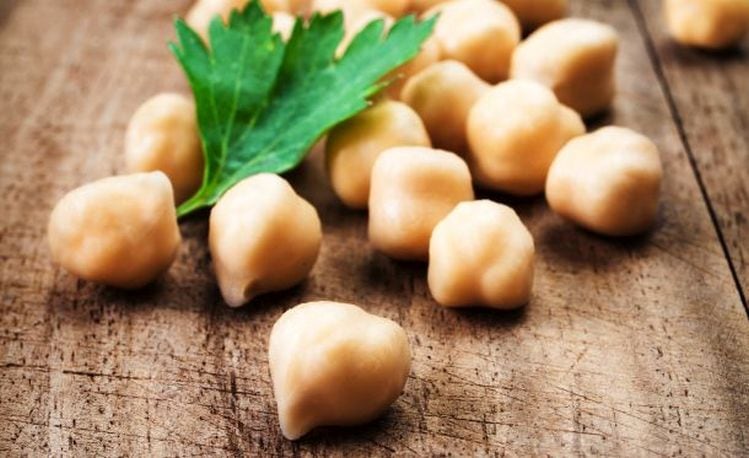The partnership will accelerate the rollout of Nutriati’s chickpea ingredients - which were launched into the market in 2018 and made with chickpeas grown in the US and Canada – by tapping into Tate & Lyle’s global network of contacts, CEO Michal Todd told FoodNavigator-USA.
“We view this partnership as really speeding up our growth and scaling plans as Nutriati works to become the preeminent supplier of alternative proteins, so we are already looking at applying our Artesa PureProcess to other crops such as fava beans.”
He added: “Things are going phenomenally well. Our revenue this year will be about double what it was in 2020.”
Chickpea protein has unique functional and organoleptic properties
While a few companies are now developing more functional chickpea ingredients such as InnovoPro in Israel, chickpea protein is still relatively unknown to food formulators as it’s not produced on a commercial scale by any of the major players in plant proteins, despite the fact that chickpeas are widely grown and relatively cheap compared to some other potential new sources of plant-based protein.
Nutriati’s Artesa chickpea protein - which is white, odorless, and neutral-tasting with a hint of nutty sweetness – has no beany taste, which makes it attractive for manufacturers of products such as plant-based beverages and ice cream, said co-founder and CTO Michael Spinelli, a food R&D veteran who rose up the ranks at Ben & Jerry’s and chickpea-fueled brand Sabra, and co-founded Nutriati in late 2013.
“When you look at foaming, mouthfeel, and viscosity, we can offer functionality that you don’t get from some of the other [commercially available] plant proteins.”
Thanks to a patented proprietary production process, the protein has a small, uniform particle size that delivers a superior taste, aroma, mouthfeel, and appearance, and helps it beat plant-based rivals in the functionality stakes, delivering superior water and oil binding qualities, freeze/thaw stability, solubility/dissolution and suspendibility, allowing for higher inclusion levels and shorter, cleaner labels, claimed Spinelli.
“Another part of our process is focused on creating a very fine and consistent particle size, which leads to very strong dispersibility and suspensibility in emulsions.”
Chickpea milk with neutral taste and 8g protein
Todd added: “So we have made one of the best milk alternatives out there at the University of Minnesota's pilot plant, so we remove the oil, so we get a color improvement over competing proteins, which is a big deal, we mill to a very fine and consistent particle size, which helps to keep everything in suspension, and the taste is clean, with 8g protein per 240ml serving [the same as dairy milk]."
Spinelli added: “We can create ice cream and cultured products such as yogurts and cheeses and you don’t get that sandy or gritty mouthfeel from a precipitated protein, because the particle size is so small. We are in market with a variety of different plant-based cheeses - when the protein’s put under heat and melted, it actually melts whereas the problem with a lot of plant based cheeses is that they don't lose their form.
“We’re also in sour cream, and we'll be going into an exciting QSR as a barista foamer and in mayo.”
While Artesa chickpea protein is not a complete protein like soy, egg, or casein, it is a high quality concentrated protein source with a digestibility score of 93% and a PDCAAS of 0.82 – at the top end of the scale for plant-proteins, added Spinelli.
“We are delighted to partner with Nutriati, a company that has developed patented technology to produce highly functional and sustainable plant-based ingredients through an environmentally friendly water-free separation method.”
Victoria Spadaro Grant, President, Innovation & Commercial Development, Tate & Lyle
Plant-based meat, poultry and seafood
One of the biggest areas of opportunity for Nutriati's ingredients is in plant-based meat, poultry and seafood, said Spinelli, where the protein and flour can work together to create a meatier and juicier texture in everything from plant-based chicken nuggets to fish sticks.
“What’s unique about these two flagship ingredients, the protein and the flour, is that they're both very versatile and functional, unlike pea protein or starch alone, and we’re going to be launching in multiple plant based meat brands, using both the chickpea flour and the TPP [textured pulse protein, which combines pea protein and chickpea flour].
“The chickpea flour can act as a binder and hold moisture as a lot of these plant-based meats on the market are dry. It’s also proven to be incredible as gluten-free breading for chicken nuggets and patties.
“The TPP is also proving to be incredibly effective in plant-based poultry analogs and plant based fish analogs such as crab cakes and fish sticks.”
Bakery and snacks also represent significant growth opportunities for chickpea ingredients, said Todd: “Healthy snacks is a huge category for us. We're also launching in English muffins and gluten-free breads, as a lot of gluten free products using corn and rice flour are really void of nutrition, whereas our chickpea flour has a protein comparable to wheat flour.”

Sustainability: Ethanol process has lower environmental footprint than water extraction
As for customers, while the functional traits of the ingredients are of primary importance, there are also sustainability benefits, noted Spinelli, as pulse crops such as chickpeas draw nitrogen directly from the atmosphere, so farmers do not have to buy large amounts of nitrogen fertilizer in order to grow them.
They are also a very efficient source of protein in environmental terms, requiring far less energy and water, and fewer pesticides than rival protein sources. Chickpeas are also non-allergenic and non-GMO, said Spinelli, who said Nutriati’s protein extraction process also has a lower environmental footprint than that of some other plant-based proteins.
“We do not use water, so we don't need to heat or cool all that water. We don't centrifuge anything. And we're not pasteurizing or spray drying, so we don’t have the effluent stream to deal with.
“We use a recyclable, pure non GMO verified ethanol and then we completely remove that and reuse that in our process. And then we have a dry process thereafter. It's completely mechanical.”
While some companies make a virtue of a water extraction process as it sounds more consumer-friendly, it has a higher environmental footprint, he claimed. “At scale, the Nutriati process - compared to any isoelectric precipitation process - is going to have a significantly lower impact ecologically, it's also going to be significantly more economically viable at scale.”
As for perception, he said, “We've had this conversation with customers and I think all of them have come around the idea that a regenerative recyclable ethanol stream is sustainable.”

